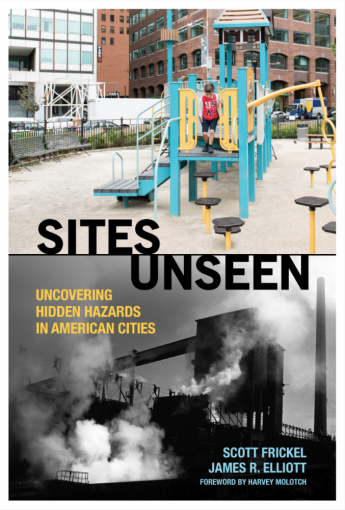 NEW YORK – A new book published today by the Russell Sage Foundation reveals how chemical and other industrial hazards are far more prevalent in American cities than previously known. In Sites Unseen: Uncovering Hidden Hazards in American Cities, sociologists Scott Frickel and James R. Elliott examine how economic, sociodemographic and political processes interlock to generate and then hide former industrial sites in U.S. cities.
NEW YORK – A new book published today by the Russell Sage Foundation reveals how chemical and other industrial hazards are far more prevalent in American cities than previously known. In Sites Unseen: Uncovering Hidden Hazards in American Cities, sociologists Scott Frickel and James R. Elliott examine how economic, sociodemographic and political processes interlock to generate and then hide former industrial sites in U.S. cities.
Looking at Philadelphia, New Orleans, Portland, and Minneapolis, Frickel and Elliott present new research that shows how former manufacturing sites, such as plastics factories and machine shops, leave behind hazards at a scale that far exceeds what is monitored by the government. Indeed, they find that 90 percent of such sites in these cities have now been converted to urban amenities such as homes, restaurants, and playgrounds, with almost no environmental review.
In the book, the authors examine how environmental agencies and regulations focus resources on just a handful of publicly visible "eyesore" sites, leaving a long trail of invisible and unknown risks across today's cities. In this moment of changing cities, minority and low income communities as well as middle income groups are all impacted by these risks. Rapid turnover of businesses and housing stock also leads to increased exposure.
As urban populations grow and there is political and economic pressure to redevelop old industrial lands, Sites Unseen highlights the need to address the forgotten industrial history of urban areas and understand the risk to residents.
Other findings include:
-
Government databases dramatically downplay the scale of industrial hazards present in American cities. For example, the EPA's Toxic Release Inventory for 2008 identified 19 active manufacturers in Philadelphia operating in major hazardous sectors in Philadelphia. But, the authors' data for Philadelphia found that 364 manufacturers were operating in these sectors in 2008, and nearly 4,000 since the mid-1950s.
-
The density of hazardous sites in cities is continuously increasing in what the authors call, "industrial churning." Manufacturers tend to open plants on new, non-industrial lots rather than lots previously occupied by other manufacturers, which results in industrial hazards continuing to spread relatively unabated.
-
While manufacturing has declined in American cities, a large percentage of new urban factories are small, allowing them to escape federal reporting requirements and go "missing" even as they contribute to the relic wastes of tomorrow.
- Current zoning rules and hazardous waste regulations are insufficient to address the scope of this problem. Local, state and federal regulatory agencies have proven incapable of tracking these sites and attending to any problems associated with legacy wastes at them.
About the Authors
Scott Frickel is Professor of Sociology and the Institute for the Study of Environment and Society at Brown University. He holds a Ph.D. from University of Wisconsin-Madison (2000). Before coming to Brown he held faculty appointments at Tulane University and Washington State University, where he was the Boeing Distinguished Professor of Environmental Sociology. His research and teaching interests center on the intersections of nature, knowledge, and politics.
James R. Elliott is a Professor and Department Chair in the Sociology department at Rice University. He received his Ph.D. in Sociology (with a minor in Geography) from the University of Wisconsin-Madison in 1997, after which he worked as a postdoctoral fellow at the University of North Carolina at Chapel Hill. His research focuses on social inequalities revealed by natural hazards, the historical accumulation and spread of hazardous wastes, and the link between urbanization and carbon emissions.
About the Russell Sage Foundation
The Russell Sage Foundation is the principal American foundation devoted exclusively to research in the social sciences. The Foundation is dedicated to strengthening the methods, data, and theoretical core of the social sciences as a means of improving social policies. The Foundation is a research center for a select group of Visiting Scholars each year, a funding source for studies by scholars at other academic and research institutions, and an active member of the nation's social science community. The Foundation also publishes, under its own imprint, the books and a journal, RSF, that derive from the work of its grantees and Visiting Scholars.
For more information, contact ben.schaefer@berlinrosen.com